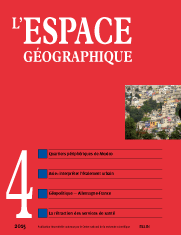

(5 fig.; 2 tabl.)
This article studies the social divisions of Mexico-City's space at the smallest available level, the city block. Such an analysis, based on census data and empirical work, questions the dynamics that undercut the colonias populares in the city’s outskirts, which are often considered in terms of urban fragmentation and/or systematic consolidation. Constructing a typology with poverty indicators highlights the heterogeneity of sociospatial forms of division. New contextual dimensions emerge and differentiate these neighborhoods, highlighting a plurality of maturation trajectories.
keyword: COLONIAS POPULARES, SOCIAL-SPATIAL DIVISION, MATURATION, MEXICO-CITY, OUTSKIRT
Depicting strongly growing urban areas in the global South. Positioning according to works on Asian cities expansion
Using the work of several scholars, this position paper suggests possible paths in the study of the diverse forms of urban expansion that ripple out across emerging countries, notably in Asia. With global productive capacities relocating within Asian cities, these urban centers are expanding at unrivalled rates. Little research has been carried out on the urban sprawl in the Global South. These supposedly universal paradigms used to conceptualize western urbanisation tend to acknowledge non-Western dynamics as backward. However, the convergence implies both the decline of cities in the Global North and the rise of cities in the Global South within a middle path characterized by flexibility and uncertainty. A connected geography is required to shift to a global perspective of urban dynamics.
keyword: DESAKOTA, PERIURBAN, URBAN CONVERGENCE, URBANISATION, URBAN MODE
Nicolas GINSBURGER, Marie-Claire ROBIC. French-German conversation: Geopolitics in the fifties
Pierre RIQUET. “Geography as science or as justification”
Claude BATAILLON. 1955, geopolitics and applied geography
Yves GUERMOND. Geopolitics: From radicality to ubiquity
Thierry SANJUAN. China seen by Jean Dresch in the middle of 1950s
Olivier ORAIN. An attempt at exhausting a Parisian conference
Active geographers and political geography. Comparing the portraits of Wolfgang Hartke and Jean Dresch in the 1950s
In May 1955, Wolfgang Hartke and Jean Dresch held a public debate on applied geography at the Sorbonne. They were both experienced men who had just reached the summit of their respective scholarly fields. Hartke had already made a name for himself as one of the founders of the new German “social geography”; whereas Dresch was a renowned specialist of physical geography and North Africa, particularly Morocco. In many ways, they shared similar career trajectories. Both leaders of European Geography, they met ten years after the end of the Second World War to discuss geopolitics, which was far beyond the realm of their research focus. This article will examine the reasons that explained the conference.
keyword: APPLIED GEOGRAPHY, JEAN DRESCH, GEOPOLITICS, WOLFGANG HARTKE, SOCIAL GEOGRAPHY
Trying to not “lose sight of geography altogether”. The diversity of French and German political geographies in the 1950s
After World War Two, geopolitics and political geography were discredited in France and Germany due to the close links between Karl Haushofer’s school and the Nazi regime. However, a number of signs would suggest that these two branches of human geography were actually rife with contradictory tensions in the 1950s. The memory of past errors was very much alive despite ongoing debate. It coexisted alongside the determination to consider both the spatial mutations of European societies under reconstruction and international relationships, especially in the context of the Cold War and the first steps of the construction of Europe.
keyword: LAURENT CHAMPIER, GEOPOLITICS, PIERRE GEORGE, POLITICAL GEOGRAPHY, PETER SCHOLLER
Exploring shrinking spatial processes: Health services in the French urban system
This paper transposes the spatial innovation’s diffusion theory onto shrinking processes; using the evolution of the distribution of health services in the French urban system as a case example. Concepts of concentration and shrinking help systematically study the spatial dynamics of medical services. Our hypothesis is of a feedback between urban demographic dynamics and medical spatial dynamics.
keyword: DIFFUSION OF INNOVATION, MEDICAL SERVICES, POLARIZATION, SHRINKING, URBAN DECLINE, URBAN SYSTEM
L’espace géographique 3/15![]()
![]() L’espace géographique 1/16
L’espace géographique 1/16
For subscribe or buy this issue: BELIN
![]() L’Espace géographique: contents
L’Espace géographique: contents
Last modified: January 30, 2016